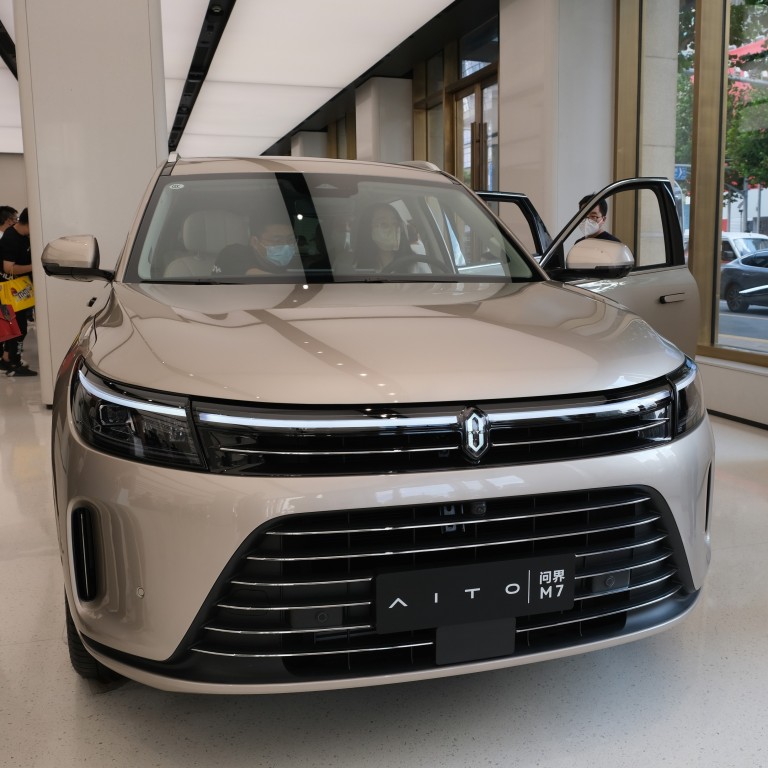
Huawei’s carmaking partner Seres aims to sell one million EVs by 2026 in face of tough competition: report
- Huawei and Seres have signed a deal to deepen their cooperation on making EVs, according to report
- Aito, co-developed by Seres, was Huawei’s first high-profile move into the car business as part of its efforts to look for new sales streams
Huawei Technologies Co’s carmaking partner Seres has published a target to sell 1 million electric vehicles (EV) by 2026, banking on closer collaboration with the Chinese tech giant as it takes on cutthroat competition in the world’s largest car market.
The two companies, who co-developed premium EV brand Aito, signed a deal on Saturday under which Huawei will develop artificial intelligence and other technologies to aid the driving experience while Seres will work on materials and manufacturing craftsmanship, according to a report by state-owned media outlet China Securities Journal.
Seres also announced a goal of producing and selling 1 million units of new energy vehicles (NEV) by 2026 based on the partnership with Huawei, with new models incorporating an advanced AI driving system.
Richard Yu Chengdong, chief executive of Huawei’s car unit, described Seres as the company’s earliest and closest car-making partner and said it will continue its long-term partnership with the carmaker in future, according to the report.
Huawei declined to comment on the report. Seres did not immediately respond to a request for comment.
The report of deeper cooperation between Seres and Huawei came after speculation earlier this month that Huawei was about to part ways with Seres as it looked for new partners. Both companies denied the reports.
‘100 yuan cheaper than Tesla’: Huawei-backed premium EV brand Aito cuts prices
Aito was Huawei’s first high-profile move into the car business as part of its effort to look for new sales streams after Washington put the company on its Entity List over national security concerns in 2019. The trade sanction bars the company from doing business with US firms without a licence and has hurt its lucrative smartphone business.
Initially launched in December 2021, Aito began deliveries last March, selling a total of 76,180 units by the end of 2022, according to Aito’s data. The actual deliveries compared with an ambitious goal of 300,000 for 2022, a target enunciated but later retracted by Yu in December 2021.
Aito ranked sixth in sales among Chinese EV start-ups in 2022, according to delivery figures released by the companies. The leader of this group was Hozon Auto’s Neta, followed by Beijing-based Li Auto and Shanghai-based Nio.
In an effort to boost sales, Aito cut prices of its M5 and M7 models by as much as 30,000 yuan (US$4,444) last month, following sweeping markdowns by Tesla in the China market.
However, the discounts have failed to give Aito a boost amid overall weakness for Chinese EV start-ups in January. It delivered 4,475 units in the month, down by half compared to December. Tesla, however, saw 18 per cent growth compared to December, with 66,051 units sold in January, according to data by the China Passenger Car Association.
Even if Aito hits the key 1 million sales barrier set out by Seres above, it will still have a long way to catch up with established competitors including Shenzhen-based BYD, which sold 1.86 million units in 2022, most of them in China, making it the world’s largest EV producer.

